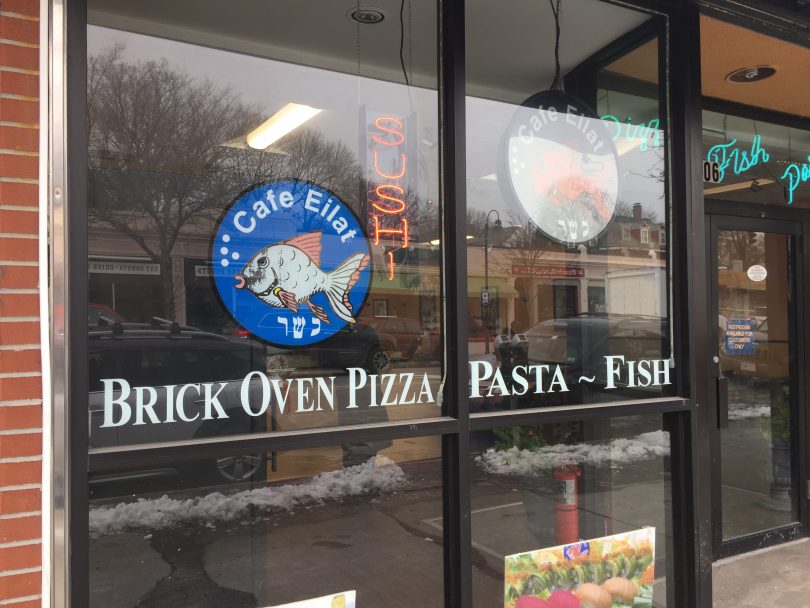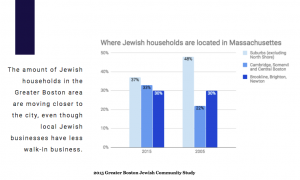By Greg Levinsky
BU News Service
BROOKLINE, MASS – Traditional Jewish bagels and rugelach are available at Kupel’s Bakery on Harvard Street in Brookline. You can still pick up tallit and mezuzahs at the Israel Bookstore down the street. However, the days when Jewish shops dominated the Coolidge Corner neighborhood are beginning to fade. Harvard Street in Brookline is starting to see its chutzpah dwindle or at least change a bit.
In August, Rubin’s Delicatessen shut its doors after 90 years, signaling a change in demand for Jewish food and services. In response, shops up and down the street are adjusting business models to meet the demands of a broader customer base.
Catering by Andrew opened 25 years ago as a branch of Andrew Wiener’s father’s café. Wiener chose to focus on his catering expertise and built a business supplying deli spreads and Passover packages to customers in New England and New York.
He described Harvard Street as “diversified.” Non-Jewish businesses like Dorado Tacos Boston and Union Square Donuts help keep the area vibrant, he said. Weiner said the diversification of the neighborhood’s businesses is good, as the population is far from being strictly Jewish.
“I think that the area is growing nicely,” Wiener said. “If the place was a Jewish enclave, it would be different, but it’s not that way.”
Rabbi William Hamilton of Congregation Kehillath Israel on upper Harvard Street has served as the congregation’s rabbi since 1995. He said changes have been ongoing not only in Brookline but in greater Boston’s Jewish community for decades. He said certain businesses withstood the test of time while others could not.
“Some of this stuff is strong and some of it was not as sustainable as we believed,” Hamilton said in reference to the area’s Jewish businesses. “They didn’t close because no one wanted to patronize them, they just ran out of gas, so to speak.”
After Rubin’s Delicatessen’s closure, a once time-defying icon, has now signaled a need for change by local Jewish businesses. The Israel Book Shop, Kolbo Fine, Judaica Cafe Eilat and Catering by Andrew are all adjusting their business models to meet demands of a changed, and geographically wider, customer base.
According to the Jewish Virtual Library, seven percent of Boston’s population is Jewish and 30 percent of the Jews in Boston live in Brookline, Newton or Brighton.
Miriam Natan, a salesperson at Israel Book Shop has been an employee for 32 years, nearly half the time the store has been open. She acknowledged a shrinking business in the area recently.
“We have been closing parts of the store because people don’t go out to shop,” Natan said. “In the last ten years it has started to get very, very changed.”
Chana Weisenberg has spent the last two decades working with Natan. Weisenberg said the store recently closed a room dedicated to music and while there are certain specialty items customers come for, the businesses clientele and landscape has changed. But, it’s not all about neighborhood demographics; it’s technology.
“Everything is on the computer, on the telephones,” Natan said. “It’s a good thing but also bad.”
One bad outcome, she said is, “Everybody’s in a hurry with no time to read books.”
Natan said the local religious schools are merging together and ordering fewer textbooks. Weisenberg said customers from far away still venture to the classic store and the biggest impact on business is the internet.
“People still come from all over – I think business in general is less for all bookstores because of the internet,” Weisenberg said.
Despite evidence of Jewish families moving nearer to the city, going from 22 percent in 2005 to 33 percent in 2015, the Harvard Ave. shops do not get the walk-in business they once did.
Eran Hornick has worked at Kolbo Fine Judaica across the street from Israel Book Store for six years. While being late to the game in terms of increasing their online presence, Hornick said Kolbo changed their point of sale system and increased online presence in order to both catch up and stay afloat with a shrinking neighborhood Jewish community.
“We’ve definitely tried to expand into the digital and virtual world by redesigning our entire website and investing in social media,” Hornick said. “Those are things that we didn’t do at all when we started.”
Hornick and his coworkers embrace the challenge of branching out beyond their traditional customer base.
“It’s a huge challenge and there’s definitely so much effort that has to go into it,” he said. “It’s a complex process.”
Hornick said he sees the Jewish community shrinking in Boston and the internet allows Kolbo to reach a wider audience.
“The idea is that we are able to springboard ourselves into [others] consciousness and have a presence elsewhere,” he said. “The idea is not just to have our patrons be Bostonias but be United States citizens and people of the world.”
In the food industry
Joey Hasson is studying law while working at Cafe Eilat, a kosher pizza shop on the corner of Harvard and Fuller Streets for the last 11 years. He joined the business as a 16-year-old and worked his way up to being a manager.
Cafe Eilat has taken advantage of food delivery services such as UberEATS, Postmates and GrubHub, Hasson said. They are trying to expand to a wider clientele base to better service traditionally observant Jews but also local college students and neighborhood residents.
He said on any given day customers can range from observant Jews to people with similar dietary restrictions to Kosher – or even people ordering pizza on a whim. When Hasson started, roughly 30 percent of the business was focused on catering and delivery, now it’s closer to 90.
“A big portion of that has to do with the rise of apps and that’s a big reason why we’re sticking around,” Hasson said.
Hasson said Pizza is one of America’s universal foods that never goes out of style and Cafe Eilat’s business has reaped some major benefits from the digitization of the modern world. He also said businesses like Rubins which focused solely on in-house dining are not set up for longevity.
Being in the food industry is an inherent advantage from the book and niche item stores, Hasson said.
“You don’t necessarily need books or music to survive,” Hasson said. “With a place like this, the things that keeps us going is the app world. Any business will need that to survive.”






